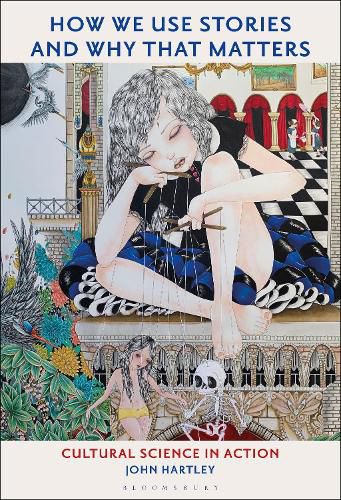Readings Newsletter
Become a Readings Member to make your shopping experience even easier.
Sign in or sign up for free!
You’re not far away from qualifying for FREE standard shipping within Australia
You’ve qualified for FREE standard shipping within Australia
The cart is loading…






Using compelling examples and analysis, this open access book How We Use Stories and Why That Matters shows what the New York Shakespeare Riots tell us about class struggle, what Death Cab for Cutie tells us about media, what Kate Moss’s wedding dress tells us about authorship, and how Westworld and Humans imagine very different futures for Artificial Intelligence: one based on slavery, the other on class. Together, these knowledge stories tell us about how intimate human communication is organised and used to stage organised conflict, to test the ‘fighting fitness’ of contending groups - provoking new stories, identities and classes along the way.
This book guides the reader through the tangled undergrowth of communication and cultural expression towards a new understanding of the role of group-mediating stories at global and digital scale. It argues that media and networked systems perform and bind group identities, creating bordered fictions within which economic and political activities are made meaningful. Now that computational and global scale, big data, metadata and algorithms rule the roost even in culture, subjectivity and meaning, we need population-scale frameworks to understand individual, micro-scale sense-making practices. To achieve that, we need evolutionary and systems approaches to understand cultural performance and dynamics.
The opposing universes of fact (science, knowledge, education) and fiction (entertainment, story and imagination) - so long separated into the contrasting disciplines of natural sciences and the humanities - can now be understood as part of one turbulent sphere of knowledge-production and innovation.
The ebook editions of this book are available open access under a CC BY-NC-ND 4.0 licence on bloomsburycollection.com. Open access was funded by Knowledge Unlatched.
$9.00 standard shipping within Australia
FREE standard shipping within Australia for orders over $100.00
Express & International shipping calculated at checkout
Using compelling examples and analysis, this open access book How We Use Stories and Why That Matters shows what the New York Shakespeare Riots tell us about class struggle, what Death Cab for Cutie tells us about media, what Kate Moss’s wedding dress tells us about authorship, and how Westworld and Humans imagine very different futures for Artificial Intelligence: one based on slavery, the other on class. Together, these knowledge stories tell us about how intimate human communication is organised and used to stage organised conflict, to test the ‘fighting fitness’ of contending groups - provoking new stories, identities and classes along the way.
This book guides the reader through the tangled undergrowth of communication and cultural expression towards a new understanding of the role of group-mediating stories at global and digital scale. It argues that media and networked systems perform and bind group identities, creating bordered fictions within which economic and political activities are made meaningful. Now that computational and global scale, big data, metadata and algorithms rule the roost even in culture, subjectivity and meaning, we need population-scale frameworks to understand individual, micro-scale sense-making practices. To achieve that, we need evolutionary and systems approaches to understand cultural performance and dynamics.
The opposing universes of fact (science, knowledge, education) and fiction (entertainment, story and imagination) - so long separated into the contrasting disciplines of natural sciences and the humanities - can now be understood as part of one turbulent sphere of knowledge-production and innovation.
The ebook editions of this book are available open access under a CC BY-NC-ND 4.0 licence on bloomsburycollection.com. Open access was funded by Knowledge Unlatched.